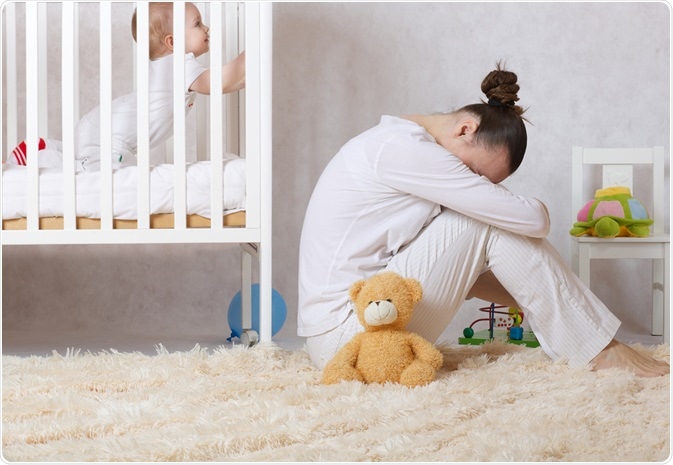Worthless thoughts that create instant fear and anxiety are called intrusive thoughts. These thoughts can be images, visuals, or voices and can pop up in any unrelated situation. Intrusive thoughts play a significant role in increasing the risk that a woman will suffer from postpartum depression (PPD).

Postpartum depression
Postpartum depression (PPD) is a mood disorder (depression) that affects women during the period of pregnancy, following delivery or even years after childbirth. Mothers with postpartum undergo feelings and thoughts such as fear, anxiety, exhaustion, and sadness. These thoughts can make their day difficult, showing little regard for themselves and their baby.
Postpartum depression occurs due to a combination of both mental and physical factors. Mothers themselves are not responsible for the emergence of this condition. After the birth of the child, there is a drop in the quantity of hormones in the body, which results in a change of chemicals in the brain and can lead to depressive thoughts and mood shifts.
Moreover, a new mother desperately needs good and sound sleep to recover from the tiredness of giving birth. Hence, lack of sleep is another important factor that can cause postpartum depression.
Kinds of postpartum depression
Postpartum depression can be categorized into two kinds – postpartum blues and postpartum depression. Postpartum blues is a minor condition that exists only for a short time, whereas postpartum depression is an advanced stage that carries more serious effects.
Postpartum blues
In this kind, the new mother often experiences frequent swings in mood due to ruminating intrusive thoughts. She may also feel tearful, anxious, have a hard time sleeping, and be easily irritated. This usually occurs after the second or third day of giving birth.
It is not a very serious condition, and tends to affect 50–70% of all new mothers. If the condition lasts for more than a week, it is advisable to consult a doctor. Research has found that one in every five postpartum blues mother is affected by serious postpartum depression.
Postpartum depression
This kind of depression develops soon after childbirth, or a week after childbirth. Postpartum depression is a serious medical condition that often requires medication. Here, the mother first may start to lose interest in daily activities. Other signs may include lack of concentration in the real world, feeling unworthy and useless, and constantly having intrusive thoughts about death and committing suicide.
Postpartum Behavior
The behavior of every mother who suffers from postpartum depression are often somewhat similar and are a result of the constant play of intrusive thoughts in the mind. The different types of behaviors a new mother may showcase are:
- Tension and anxiety
- Restlessness and irritability
- Poor memory and decision-making skills
- Frequently falling sick or getting body pains
- Keeping distance or avoiding family and friends
- Eating too less or eating too much food
- Always feeling sad and depressed
- Frequently crying without any reason
- Losing interest in the baby
Types of intrusive thoughts in postpartum depression
Intrusive thoughts play a major role in causing postpartum depression in new mothers. These thoughts give rise to severe anxiety, fear, and result in intense depression. Mothers with intrusive thoughts may find it difficult to overcome them and are more easily affected by postpartum depression. Examples of different types of intrusive thoughts in postpartum depression include:
- What will happen if I drop the baby from the stairs?
- What if I drown the baby in the bathtub?
- What if I stab the baby with a kitchen knife?
- Should I leave the baby alone in the car for the night?
- Am I having sexual thoughts about my baby?
- Imagining some violent happenings to the baby.
- Doubting one’s ability of taking care of the child.
- Images of harming oneself.
Handling postpartum intrusive thoughts
Sufferers of postpartum depression thoughts must keep in mind that these thoughts are not a part of their character. They are just symptoms of a game being played by the brain. Paying undue attention to these thoughts makes the brain believe in them.
A common way to avoid these thoughts is by distracting the attention. When such thoughts arise, it is advisable to reiterate to oneself that they are just irritating thoughts and that nothing untoward will happen. Engaging oneself in puzzles or other mind-related games strengthens the will to ward off such thoughts.
As soon as these thoughts occur, it can be helpful for affected women to try listening to some loud music or go for a walk alone. Frightening thoughts can be disturbing when kept to oneself and sharing them with someone, such as your partner, can drastically reduce the impact on the individual. Some solace from the another person that all is well can provide instant relief from the intrusive thoughts.
References
- http://www.postpartumprogress.com/the-symptoms-of-postpartum-depression-anxiety-in-plain-mama-english
- https://www.psycom.net/depression.central.post-partum.html
- http://postpartumprogress.org/2011/02/the-symptoms-of-postpartum-depression-anxiety/
- http://www.psychguides.com/guides/living-with-postpartum-depression/
- https://www.nimh.nih.gov/health/publications/postpartum-depression-facts/index.shtml
- https://ocdla.com/postpartum-ocd
Further Reading
- All Postpartum Depression Content
- What is Postpartum / Postnatal Depression?
- Postpartum / Postnatal Depression Causes
- Postpartum / Postnatal Symptoms
- Postpartum / Postnatal Treatment
Last Updated: Jan 25, 2021
Source: Read Full Article